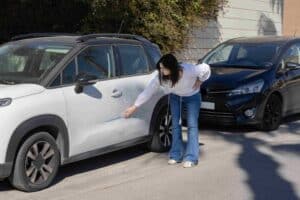
Imagine stepping out of a store or returning to your vehicle after a day’s work only to find it damaged by another driver. These situations are never pleasant, and navigating the aftermath can be daunting.
At Jonathan Perkins Injury Lawyers, our Connecticut accident attorneys understand how important it is for drivers to understand their rights in these situations. Knowing the correct legal and financial steps can be the difference between a swift resolution and prolonged headaches when someone hits your parked car.
Immediate Steps to Take
Dealing with a damaged parked car can be stressful, but taking the right steps can make a difference in your legal and financial journey. Here’s a step-by-step guide on what to do:
Document the Scene
Always document the scene. Capture clear photos of the damage from multiple angles; these images can be helpful when dealing with insurance companies and potential legal issues. If there are witnesses who saw the incident, approach them.
Their testimonies offer clarity and can be beneficial if your claim is disputed or denied. In Connecticut, evidence supporting your claim is essential to ensure a favorable outcome.
Report to the Police
Regardless of the extent of the damage, always notify the police. In Connecticut, it’s not just a good practice but often a requirement, especially when damages exceed a certain amount.
By getting an official report, you provide a record of the incident that can protect your rights and interests in the future. Plus, many insurance claims require a police report for processing, even for minor damages.
Informing Relevant Parties
Once the immediate scene is dealt with, the next step is to inform the right parties. Communication is crucial and beneficial in these situations.
Contact Your Insurance
Even if the incident wasn’t your fault, you must notify your insurance company about the accident. This proactive approach lets you initiate the claims process and ensure your insurer knows what is happening.
In Connecticut, understanding the local insurance laws and policies is essential. For example, Connecticut operates under an “at-fault” system, which means the insurance company of the person responsible for the accident typically pays for damages. By reporting the incident, you’re arming yourself with the protection and resources your insurance policy offers.
Reach Out to the Other Party
Communication with the other involved party is not just about sharing details; it’s about understanding their perspective, too. Approach the conversation calmly and stick to the facts.
Ask for their version of events and gather their insurance information. Gathering these details can streamline the claims process and help resolve potential disputes.
Understanding Connecticut’s Legal Framework
Navigating the aftermath of a car accident requires understanding the state’s legal framework. Here’s what you need to know:
Connecticut’s At-Fault System
Connecticut operates under an “at-fault” system for car accidents. This means that the party determined to be at fault for the accident is responsible for the damages. Their insurance company typically covers these costs.
If the at-fault party does not have insurance, they may be held personally liable. This is a situation a car accident attorney can help you understand.
Statute of Limitations for Property Damage
You must be mindful of time constraints if your parked car is damaged and you wish to pursue a lawsuit. The state allows a two-year window from the accident date to file a lawsuit for property damages. Missing this deadline could result in losing the right to pursue compensation, regardless of the merits of your case.
Seeking Legal Counsel
While navigating the legal terrain can be challenging, consulting with an attorney can make a difference. An attorney offers guidance on your rights, potential compensation, and the best way forward.
How to Prevent Future Incidents
While accidents are sometimes unavoidable, preventive measures can reduce the likelihood of recurrence.
Strategic Parking
Choosing safer parking spots is the first line of defense. Opt for well-lit areas, away from busy intersections, and preferably in view of security cameras. This not only deters potential culprits but also minimizes risk.
Installing Dash Cams
A dash cam can be your silent witness. These devices continuously record and can provide indisputable visual evidence in disputes. Especially in hit-and-run scenarios, a dash cam can capture crucial details.
Regular Maintenance Checks
Ensure your vehicle’s parking brakes and other safety systems are in prime condition. Regular check-ups and maintenance can prevent mishaps caused by mechanical failures.
Understanding What Steps to Take When Someone Hits Your Parked Car
Discovering your parked vehicle is damaged can ruin your day. However, you do have legal recourse in this situation.
Use the information here to take the right steps to protect yourself and your ability to recover compensation from the at-fault party. An experienced injury attorney from Jonathan Perkins Injury Lawyers can help ensure you get the full compensation you are entitled to. The first step is to contact the law firm to schedule a free consultation.
